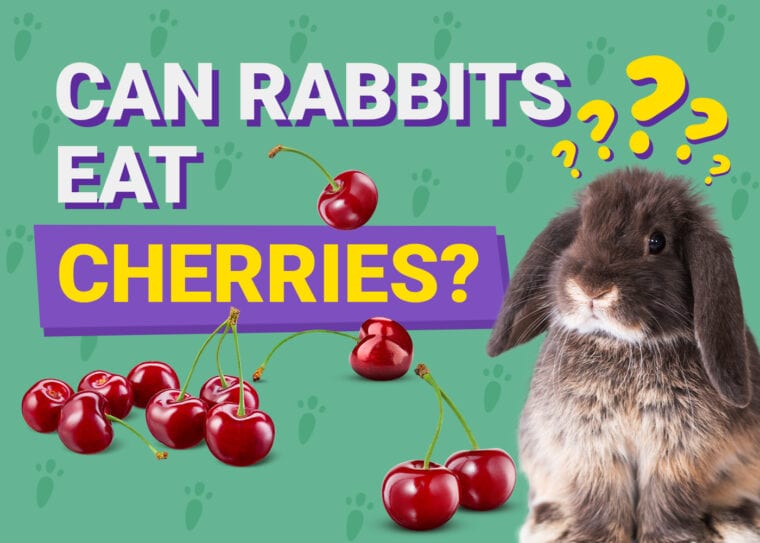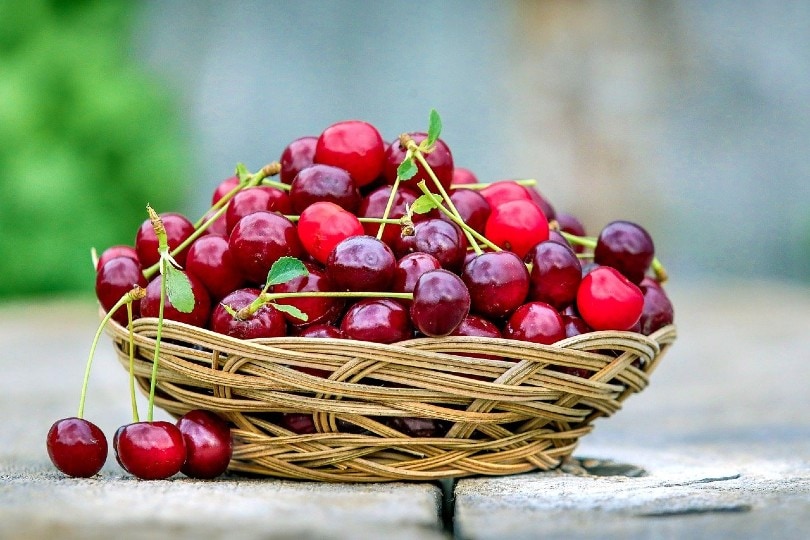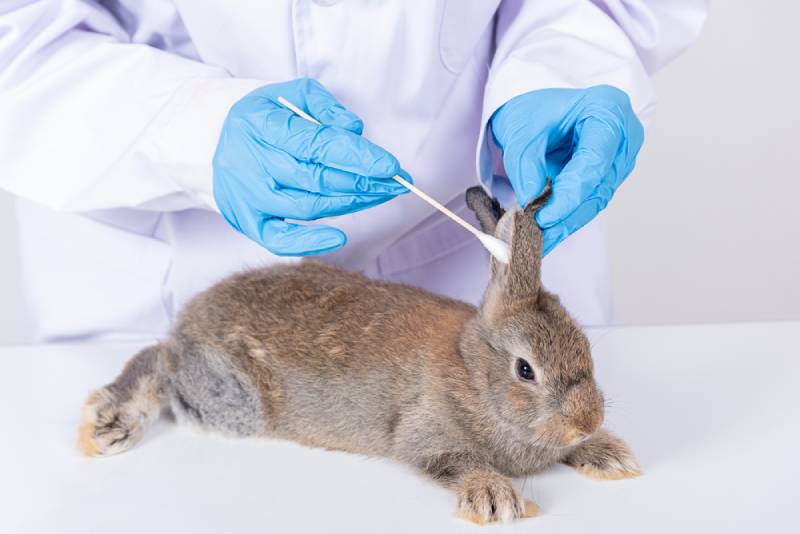
Rabbits are known for their herbivorous diet, primarily consisting of hay and grass, followed by fresh vegetables. Rabbits in the wild will not eat fruit, and their digestion is not used to processing such sugary foods. Although cherries are considered fruits, many owners can still be unsure and it’s important to determine whether they are safe for rabbits to consume.
Can rabbits eat cherries? Well, yes, however you should be aware of several health risks and precautions associated with rabbits eating fruit! Rabbits can eat cherries as long as they are prepared properly and presented in strict moderation as a rare snack. The fleshy portion of the cherry is generally safe, but the pits should be avoided.
However, fruits are not normally a part of a rabbit’s diet, and they may cause significant digestive problems, so always be cautious when offering fruits to your bunny.
Still curious? Read on as we explore should rabbits eat cherries in the first place, their nutritional benefits, how to properly feed cherries to rabbits, and potential risks that owners should know about when feeding cherries to their rabbits!
Can Rabbits Eat Cherries?
Rabbits are herbivores, which means they thrive on a plant-based diet of hay and grass, so it may come as no surprise that rabbits can eat cherries. However, in the wild, rabbits are unlikely to eat fruit and even most vegetables, and their diet will be mainly grass, clover, flowers, weeds, bark and similar.
Although rabbits can eat cherries, moderation is still key. Cherries can be a tasty and nutritious addition to a rabbit’s diet when given in appropriate amounts.
Due to the nutritional content of cherries, it’s important to note that rabbits should only consume cherries as an occasional treat. Cherries should not make up a significant portion of their diet and rabbits should still be fed a healthy and balanced diet consisting of 85% of hay and grass.
In addition, the pits of the cherries should be removed before feeding them to your rabbit as they can pose serious threats to your rabbit’s health. The pits contain cyanide which can put your rabbit at risk of poisoning if a significant amount is chewed through, which is unlikely, and only by chewing is cyanide released.
There are no reports of cyanide poisoning in rabbits from ingesting fruit pits, but veterinary professionals still urge caution. Otherwise, pits pose risk for teeth damage, choking, and gastrointestinal blockage due to their size and small size of rabbit’s digestive system.

Are Cherries Healthy for Rabbits?
Cherries may offer several nutritional benefits, but these are unlikely to be significant for rabbits, as they should eat them in moderation and not on a regular basis. Cherries are rich in carotenoids and vitamin C, which may contribute to the overall health and well-being. However, a balanced and fiber-rich rabbit’s diet with recommended addition of leafy greens and commercial pellets, is what contains all the essential nutrients rabbits need, and fruit is generally an ingredient that should not be a part of their diet.
Cherries contain a small amount of dietary fiber, but rabbit’s diet of hay is the primary source of fiber crucial for dental and digestive health. Cherries contain carbohydrates as well, which rabbits should ingest in strict moderation to avoid gastrointestinal issues and weight gain long term.
Nutritional Facts and Potential Benefits
Cherries are low in calories and fat and can be a suitable but very occasional treat option for rabbits. They contain antioxidants that can help protect the body from oxidative stress. In addition, the natural sugars present in cherries can provide a quick energy boost!
While cherries may have many potential benefits and nutritional content, they should still be considered an occasional treat. Due to cherries’ high sugar content, they should be given sparingly to prevent weight gain and other potential digestive health complications. Remember, moderation is key, and your bunny is unlikely to reap any significant benefits due to the small amount of cherries deemed safe to occasionally consume!
Do Rabbits Like Eating Cherries?
Every rabbit has their own preferences when it comes to food. While some rabbits may enjoy the taste of cherries, others may not show as much interest.
It’s essential to observe your rabbit’s reaction when introducing cherries into their diet. If they seem to enjoy them, you can continue to offer cherries as a rare treat. Be mindful that rabbits may prefer such energy dense food treats instead of their hay and veg, which in turn may cause ongoing health concerns, due to their pickiness and lack of fiber. It’s important that their diet is based on hay, and they are not given the opportunity to pick more sugary foods, that will in turn lead to digestive problems.
However, if your rabbit shows little interest or displays any signs of digestive discomfort, it’s best to avoid feeding them cherries altogether and seek advice from your vet if their health is compromised.

Are There Any Risks in Feeding Cherries to Rabbits?
While cherries are unlikely to provide nutritional benefits to rabbits, there are potential risks associated with their consumption.
The high sugar content in cherries, alongside other carbs in their diet, can lead to weight gain, obesity, and dental problems in rabbits if they are fed in excessive amounts or too often. Fruits are just not something rabbits would eat in the wild, and their digestion is not adjusted to it.
Rabbits also have sensitive digestive systems with a fine and easily disturbed gut bacterial balance and may experience gastrointestinal upset if they consume cherries or any new food in large quantities. It’s important to introduce cherries gradually and monitor your rabbit for any signs of discomfort or digestive issues. Remember that hay and grass should make up 85% of a rabbit’s daily food intake, while a mix of fruit, fresh vegetables, and leafy greens should not be more than 10%.
Why Are Pits Bad for Rabbits?
The pits or stones found in cherries are not suitable for rabbits to consume. They can pose a choking hazard due to their size and shape, or rabbits may damage their teeth trying to chew on them.
As mentioned earlier, cherry pits also contain cyanogenic compounds which can release cyanide when chewed through.
Cyanide is toxic to rabbits and can cause health issues if ingested in very large amounts, but this is highly unlikely, and there are no reports of such cases in literature. Still, it is important to remove the pits completely before offering cherries to rabbits, as they may also cause blockage of the stomach or intestines.
How to Properly Feed Cherries to Rabbits
If you decide to feed cherries to rabbits, there are a few important guidelines to follow.
Firstly, always wash the cherries thoroughly to remove any pesticides or contaminants. To prepare cherries for rabbits, start by washing them thoroughly under running water.
Once clean, remove the pits by cutting the cherries in half and scooping out the pit. It’s important to discard the pits safely, as they can be a choking hazard for rabbits or cause gastrointestinal blockage in some cases, particularly in toy and small rabbit breeds. Risk of cyanide poisoning is deemed low, but it’s better to be safe than sorry.
After removing the pits, it’s time to make it easier for your rabbit to eat the cherries. Make sure to cut the cherries into small, bite-sized pieces to prevent any potential choking incidents.

How Many Cherries Should You Feed Your Rabbits?
Due to the high sugar content of cherries, it’s essential to feed them to rabbits in moderation, or avoid them altogether if you want to be on the safe side when it comes to fruit and rabbits. As a general guideline, rabbits should not consume more than just a few small pieces of one or two cherries once or twice a week, depending on the rabbit’s size. Always consult with your vet before offering your rabbit any new fruits, and make sure to monitor them for any signs of digestive disorders, such as gut stasis or diarrhea.
It’s crucial not to overfeed cherries to rabbits, as excessive sugar alongside other sources of carbs can lead to weight gain, digestive issues, and other health problems. Always remember that the majority of a rabbit’s diet should consist of hay followed by fresh vegetables!
What Are Other Fruits That Are Safe for Rabbits?
As a rabbit parent, you’re always going to be exploring new foods to feed your rabbit. If you’re looking to offer your rabbit a variety of fruits as treats, do not forget that fruits are not appropriate for rabbits and there are several other food options that are safe and suitable for rabbits.
Still, if talking about fruits, some that rabbits can enjoy in moderation and as occasional treats are apples, strawberries, blueberries, raspberries, and watermelon.
Consult with your veterinarian about the best diet, fruit and vegetable choices for your rabbit depending on their age and health. All of these fruits provide limited additional nutrients, and they should be offered only as an occasional treat and tasty addition to their diet, while not becoming a regular part of their diet. However, it’s important to remember that fruits should be given sparingly, and that rabbits require a healthy and balanced hay-based diet, as otherwise they may develop serious health issues!
Conclusion
Rabbits can eat cherries, but they should be given as an occasional treat and in moderation. Cherries are unlikely to provide any significant nutritional benefits to rabbits, and take note that cherries should not make up a significant portion of a rabbit’s treat menu. In all honesty, fruit is best avoided in rabbits.
It is also crucial to remove the pits before feeding cherries to rabbits, as the pits can pose a choking hazard, increase the risk for dental damage, gastrointestinal upset, or blockages, and contain traces of toxin. The latter is unlikely to cause any significant issues, but it’s still best to be on the side of caution.
Providing a variety of foods for your rabbit can be exciting, but always consult with a veterinarian for specific dietary recommendations for your rabbit to ensure their overall health and well-being!










